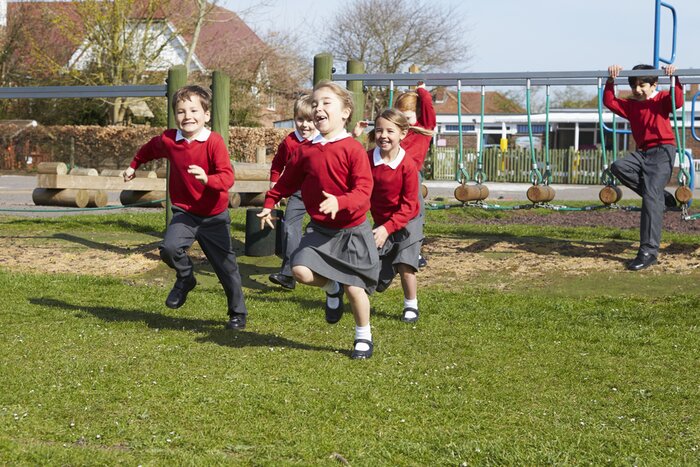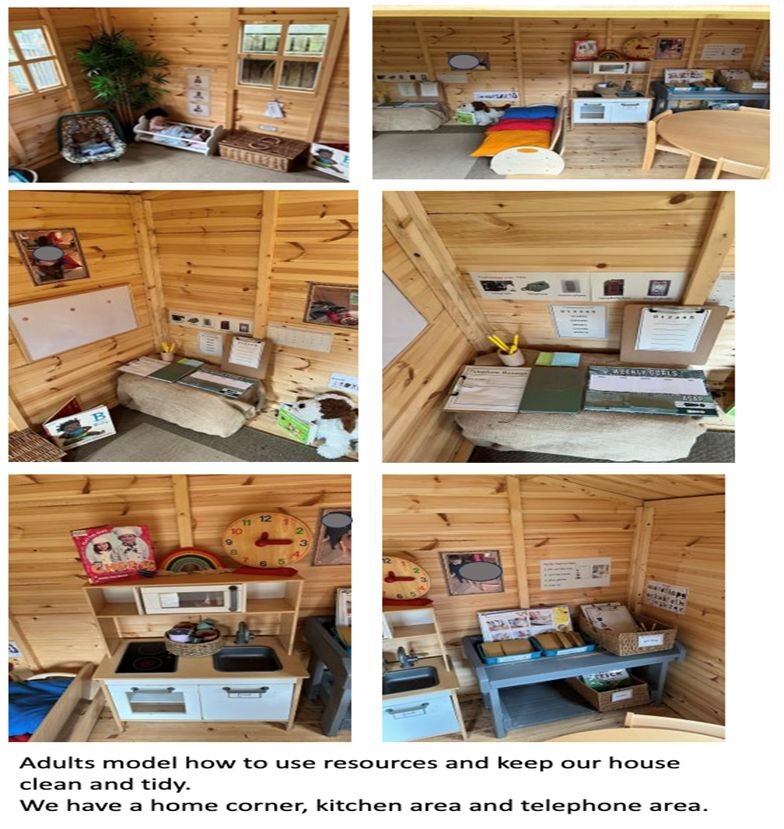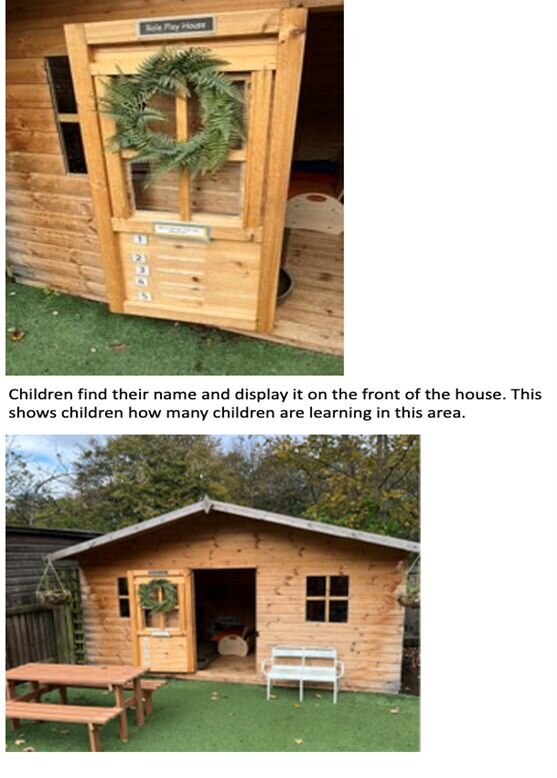
We aim to give food for thought as well as inspiring your creativity and
providing practical ideas you can’t wait to implement in your own settings!
Outdoor Learning and the
Forest School ethos in the Early Years
In this article, Reception teacher Callum Porter explains how he prioritises the outdoors
for his class and how the forest school ethos has had an impact at his school.

Over the last seven years of teaching in the Early Years, I have learnt the huge importance outdoor learning can have on children’s development and overall outcomes. Outdoor experiences provide so many opportunities for children to explore, and problem solve through the natural environment.
When planning for my children each week, I ensure that a range of activities, challenges and learning opportunities are available for them during their outdoor continuous provision. It is important to consider children’s individual needs as some children will thrive in a more unstructured outdoor space. I find that hands-on experiences with nature help support children with special educational needs as they particularly enjoy the sensory activities.
Our Outdoor Learning Areas:
Construction
An open space in the construction area allows children to move around freely, move larger blocks, crates and containers to build models and obstacle courses, developing their social and communication skills through problem solving. In this area, children are also developing their gross motor skills through a range of activities such as jumping, running, skipping, hopping and turning. I find that some children who may not favour the structured indoor environment enjoy and benefit from this area.
Water
I provide a range of floating and sinking activities for children to experience elements of science. They enjoy filling up a set of measuring jugs and moving water from different containers to experiment which ones hold more. As a challenge in this area, children are given a small experiment where they can problem solve, communicate and work as a team to find an outcome.
Role Play
My role play area has a theme that usually changes each half-term. We start at the beginning of the year ensuring adults model the correct use of new resources. The activities and role play are open ended for children to direct their learning as they choose. Children are encouraged to take turns and share which improves their social and communication skills. Children often express their own interests during role-play, drawing on their own experiences and therefore we adapt and change this area which provides children with ownership of their role play.
Stage
Our stage area is great way to develop children’s self-confidence. In the first few weeks of term, I ensure children have a stimulus to perform to or retell. This is often a familiar focus story, song or rhyme the children know well. Once children build up the confidence to perform in front of others, they soon find new stories and songs to perform. My children with lower self-confidence enjoy performing in a small group. This encourages children to build their self-esteem and I have found this is a great way to for them to form relationships in the first term.
Sand Kitchen
A large sand pit area is great for children with sensory needs as they can feel and touch the sand and add water allowing them to explore different textures. Jugs, pots, pans and utensils help children to role-play making ingredients and even set up a cafe. I provide short recipes that children can read and follow, for example, using small cards with ingredients needed (make a cake - 2 big jugs of sand and 1 spoon). I provide visual images with these instructions to ensure all children can access this.
Maths Area
The outdoor maths area differs slightly from the indoor maths area as every resource is needed on a larger scale. I recently made some large five and ten frames using sticks and a glue gun and painted large stones different colours on each side for children to use as counters. This has been good for children to make their number bonds to five and ten (2 red and 3 yellow to make 5). Children also have the opportunity to use tape measures, sand timers, conkers, pinecones and other natural resources to develop their mathematical skills. Large chalks are also available for children to mark make numbers and show different representations of these using counting resources. I have found that by displaying number lines starting with numbers 0-5 and then moving to higher numbers as the children progress through the year has been great for when matching quantities to numerals.
Reading
In the sheltered area of my outdoor space, I have set up a comfortable and calm reading area for children to foster a love of reading. A range of large books, fiction and non-fiction texts are available for children to sort and explore and there are also puppets to use to help retell their stories. I have added cushions, stools, blankets and rugs in this area to create a calming atmosphere and children even remove their shoes to ensure the area is kept clean.
Opportunities
In all areas of our outdoor provision, I ensure there are reading, writing and number opportunities for children. Initial sound cards with pictures, CVC words and short sentences are used as instructions in some areas for children to follow as they learn. Number lines and counting resources are also available, children often use fruits to count in the role-play house. Clipboards and pencils are placed in each area to support writing, for example, for recipes when baking a cake in the sand kitchen. Blank clipboards are also useful for children to draw and label models they have made in the construction area. Large chalks are also a good way to encourage children to mark make on the ground.


Forest School
In the same way as the outdoor learning opportunities, there are many benefits for children’s development through exploring their natural surroundings in Forest School. However, Forest School follows a slightly different ethos. The Forest School approach is for children to explore, experiment and take risks in a natural setting where children take complete ownership of their decisions. During my Forest School training, I learned that the sessions don’t follow a curriculum and are instead, child led. In the forest, children foster a sense of empathy and care for their natural world, their curiosity and creativity help them to build their confidence and self-esteem.
Initially, children are taught about the risks in the forest which enables them to self-evaluate activities and make decisions independently whilst staying safe. The leaders encourage, support and observe children's interactions with their natural world. As a Forest School Leader, I set up many activities that children may wish to follow, for example, identifying birds and trees, building dens and shelters. This hands-on experience allows children to explore the natural environment independently and in groups.
An important role of the Forest School Leader is to ensure children are safe at all times. Some of the activities include tree climbing, fire lighting and tool cutting which are always supervised by a trained Forest School Leader. All leaders are outdoor first aid trained. Adults will support and scaffold children's chosen activities but will encourage children to take ownership when exploring.
Children really enjoy cooking, heating and baking a range of treats, boiling water for hand-washing and hot drinks at snack time. I have found it interesting to provide children with different problems to solve in the forest. A good example of this is asking children, ‘how will we wash our hands?’. Children enjoy sharing their ideas and thinking critically about how we can use the fire to ensure we have warm, clean water.
Outdoor learning is one of my favourite areas of teaching in Early Years. I believe there are many benefits of children engaging with their natural environment and I have seen that this approach in the EYFS helps children to become successful learners, preparing them for a great start in Key Stage 1.
With many thanks to Callum Porter for writing this article.
Callum is a Reception teacher and member of the EuHu Teaching Board.